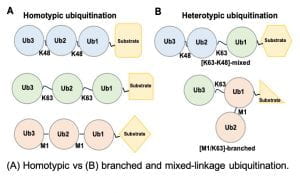Decoding complex ubiquitin signals
Ubiquitin signaling is known as the major regulatory mechanism in eukaryotic cells and a multitude of biological activities are driven through ubiquitin-dependent pathways. Ubiquitin signals can be much more complicated than mono-ubiquitins or short homotypic chains. These complex ubiquitin signals contain more than one linkage type within a single chain in a branched or linearly mixed-linkage formats. These chains are structurally complex, and the currently available methods are often indirect and do not, convincingly, differentiate them from the corresponding homologues chains. In this project, we aim to develop molecular probes for various combinations of branched and mixed-linkage ubiquitin chains.

Ubiquitin signaling in regulation of canonical NF-κB pathways
Aberrant activation of Nuclear Factor-kappa B (NF-κB) DNA transcription signaling has a major contribution to tumorigenesis and metastasis. Thus, development of therapies that selectively target components of these signaling pathways can offer significantly improved specificity and potency over most currently available cancer treatments. In this project our goal is to rationally design peptides that target ubiquitin signaling and consequently inhibit the canonical NF-κB signaling pathway.